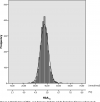I was diagnosed with pre-diabetes last year. I did all the right things, lost a lot of weight, and dragged my HbA1c down to just within the normal range. Doc is pleased, says I’ve ‘reversed’ diabetes so I no longer have a problem.
It seems to me that there’s some woolly thinking going on, though. What is the difference between a ‘diabetic well controlled by diet’, ‘not diabetic’, ‘not diabetic but insulin resistant’ etc? The HbA1c seems like a clumsy tool, since it’s not measuring how well the body handles carbs in general, but just how well an individual has balanced their intake of carbs with insulin production/effectiveness. So a non diabetic who puts away rice, pasta and potatoes but metabolises them effectively can get the same HbA1c as a diabetic who cuts carbs ruthlessly to balance lack of insulin or insulin resistance.
I can only maintain good levels of control if I eat a very carb-restricted diet. If I eat, for example, even moderate amounts of pizza, rice, pasta - all quite normal foods with carbs - my blood sugar shoots up two hours after a meal, and is really slow to come down. That tells me I’m not ‘non-diabetic’, just jolly careful about what I eat.
Am I just overthinking, or do I have a point?
It seems to me that there’s some woolly thinking going on, though. What is the difference between a ‘diabetic well controlled by diet’, ‘not diabetic’, ‘not diabetic but insulin resistant’ etc? The HbA1c seems like a clumsy tool, since it’s not measuring how well the body handles carbs in general, but just how well an individual has balanced their intake of carbs with insulin production/effectiveness. So a non diabetic who puts away rice, pasta and potatoes but metabolises them effectively can get the same HbA1c as a diabetic who cuts carbs ruthlessly to balance lack of insulin or insulin resistance.
I can only maintain good levels of control if I eat a very carb-restricted diet. If I eat, for example, even moderate amounts of pizza, rice, pasta - all quite normal foods with carbs - my blood sugar shoots up two hours after a meal, and is really slow to come down. That tells me I’m not ‘non-diabetic’, just jolly careful about what I eat.
Am I just overthinking, or do I have a point?






